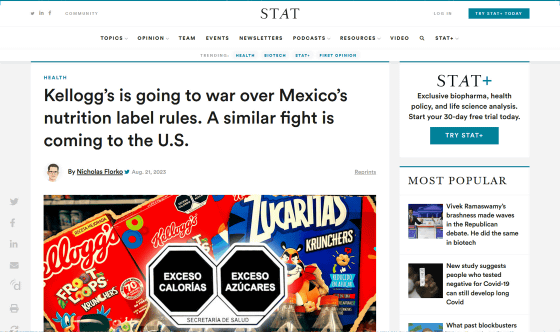How do companies resist Mexico's strict food label regulations, such as `` obligating warning labels on foods with a lot of sugar '' and `` prohibiting the use of characters ''?

by
In Mexico, where the obesity rate is high in the population, strict regulations have been established on the nutritional labeling of food and beverages from 2020, and foods with high calories or sugar are required to be warned on the package. I will . Overseas media STAT reports that major food manufacturers such as Kellogg , which is famous for cereals and processed foods, are fighting against these regulations.
Kellogg's is going to war over Mexico's nutrition label rules
https://www.statnews.com/2023/08/21/kelloggs-mexico-nutrition-label/

As a policy to reduce the obesity rate, the Mexican Ministry of Economy and the Ministry of Health require that packages contain warnings if the amount of calories, sugar, saturated fatty acids, etc. contained in food exceeds certain standards. In addition, it is prohibited to print mascot characters on the packaging of foods with warning labels to encourage children to purchase them.
These rules prevent Kellogg's from printing characters such as Tucan Sam and Tony the Tiger on packages of cereals such as Fruit Loops and Corn Frosty .

Kellogg has filed a lawsuit against the Mexican government, accusing the company of infringing on the company's rights with a policy prohibiting the use of characters. He also created
Kellogg's also sells new versions of Fruit Loops and Corn Frosty that use a sweetener called psicose (allulose) instead of sugar, and continues to feature Tucan Sam and Tony the Tiger in their packaging. The Mexican authorities also anticipate attempts by food manufacturers to replace sugar with sweeteners, and have included provisions in their policies that require warning labeling even if products contain artificial sweeteners. It is said that it succeeded in lobbying activities that do not classify it as a fee.
“We are fully compliant with regulatory requirements and have developed a variety of new food options for consumers,” Kellogg said in a statement. fulfilled,' he said.

by Mike Mozart
Kellogg isn't the only one seeking loopholes to counter Mexican policy. Beverage and food manufacturers such as Coca-Cola and Kraft Heinz have taken advantage of the mandatory warning label on only one side of the package and designed labels so that the two sides look almost identical. began to
Products with these labels have two sides that look nearly identical, but only one side has the warning. For this reason, supermarkets tend to put warning signs on the back of the shelf that discourage purchases, and turn the side without the warning label on the front side of the shelf.
In fact, when a STAT reporter investigated three supermarkets in Mexico, it seems that many carbonated drinks were displaying products in an orientation that hides the warning label. At one Walmart, only about one-third of the plastic bottles and cans of Coke had warning labels on them, and at another supermarket, only 60 Fantas on display had warning labels on them. Only 10 were reported. ``This tactic demonstrates the need for guidance to retailers on how to display their products,'' said Eva Greenthal, a senior policy scientist at the US nonprofit Center for Science in the Public Interest. I was.
Also, some food companies are adopting the tactic of printing characters on the food inside instead of not being able to print characters on the package. Binbo, a pastry maker with many brands, continues to make the characters visible from the outside by making the package transparent and printing the character on the pancake inside.
Manos van a faltar para pelarsela al Osito Bimbo pic.twitter.com/6WfOlnhSPO
— La Abuela García®™ (@rthur013) February 11, 2021
According to STAT, the U.S. Food and Drug Administration (FDA) is also considering implementing a warning label policy following Mexico's to help consumers make healthier decisions. The FDA's warning labeling policy is expected to be more conservative than Mexico's, and there is no mention of banning the use of mascot characters, but there are various resistances from food manufacturers such as lawsuits, lobbying, and exploitation of loopholes. is expected.
Isabel Barbosa , a researcher at Georgetown University's O'Neill Institute for Global Health Law, said, 'When the industry is upset or angry about something, it's generally a sign that things are going well. He pointed out that the backlash from food manufacturers is proof that the regulations are effective. He acknowledges that the US is far more conservative than Mexico in regulating commercial speech, so the terms of a mandatory warning policy can be difficult for courts.
'The food industry will fight like hell to thwart policy success,' said Eric Crosby , an associate professor of public health at the University of Nevada, Reno. It's very cunning,' he said.
Related Posts:
in Junk Food, Posted by log1h_ik







